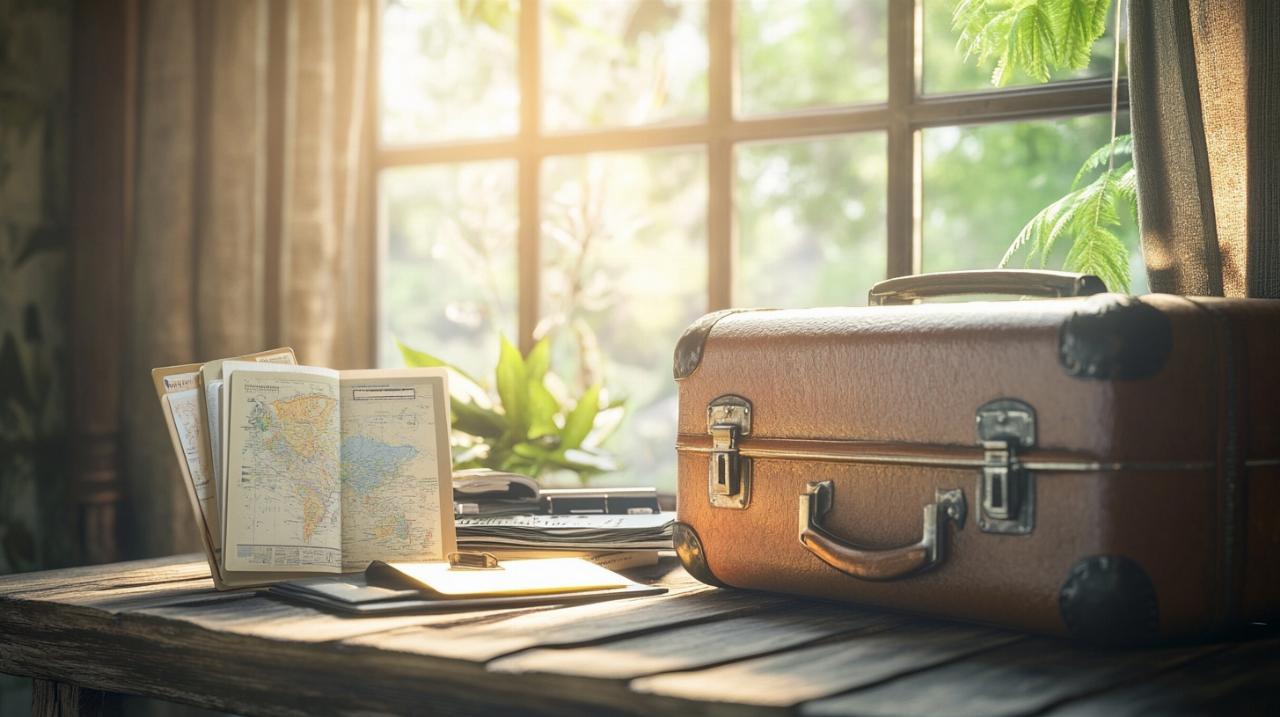Planning a holiday should be part of the enjoyment, not a source of stress that leaves you needing another break just to recover. With the right approach and a bit of forethought, you can ensure your vacation runs smoothly from start to finish. Let's explore some essential strategies to make your next getaway truly relaxing and memorable.
Early booking strategies
A well-organised holiday begins months before you pack your suitcase. Implementing essential holiday planning tips early in the process can save you both money and headaches down the road. The experts at Jacksonstravels recommend starting your preparations at least three to six months in advance for international travel, allowing you to secure the best options before they're snapped up.
Finding budget-friendly travel deals
Securing affordable travel arrangements requires timing and know-how. Consider using fare comparison websites like Skyscanner to monitor flight prices, which often fluctuate throughout the week. Many seasoned travellers suggest Tuesday afternoons often reveal the best deals, though this isn't a hard rule. Setting up price alerts can notify you when fares drop to your desired range. Additionally, being flexible with your travel dates can yield significant savings, as mid-week departures typically cost less than weekend flights.
Securing ideal accommodation options
Your choice of lodging can make or break your holiday experience. Beyond just comparing prices on booking platforms, consider the location relative to your planned activities. As recommended by travel planning experts, use Google Maps to visualise distances between potential accommodations and attractions you wish to visit. Reading recent reviews provides insights beyond the marketing photos, revealing potential issues like construction noise or unreliable wifi. Many properties offer free cancellation until shortly before your stay, allowing you to secure a good option while continuing to look for better deals.
Travel documentation essentials
Nothing derails holiday plans faster than documentation problems. Taking time to organise your paperwork properly provides peace of mind and prevents potential disasters abroad.
Passport and visa requirements
Before finalising any bookings, verify your passport's expiration date, as many countries require validity for at least six months beyond your planned return date. This often-overlooked detail has prevented many excited travellers from boarding their flights. Research visa requirements well in advance, as application processes can take weeks or even months depending on your destination. Happy Days Travel suggests checking official government websites rather than relying solely on travel blogs for the most current requirements, as these can change with little notice.
Keeping digital copies of important papers
Creating a secure digital folder with all essential documents provides a crucial safety net when travelling. Scan or photograph your passport, visa, travel insurance policy, accommodation confirmations, and transportation tickets. Store these in a password-protected cloud service that you can access from any device. Additionally, email copies to yourself and a trusted friend or family member who can assist if your devices are lost or stolen. This simple preparation can transform a potentially holiday-ruining document loss into a manageable inconvenience.
Smart packing techniques
Efficient packing enhances your travel experience by reducing physical burden while ensuring you have everything needed for comfort and convenience.
Creating an effective packing checklist
Start your packing process by developing a comprehensive list tailored to your specific destination and activities. Travel experts recommend beginning this list a week before departure, allowing time to add forgotten items as they come to mind. Organise your checklist by categories such as clothing, toiletries, electronics, and travel documents. For families, create separate lists for each member to prevent overlooking child-specific needs. This methodical approach prevents last-minute panic and reduces the likelihood of leaving essential items behind.
Minimising luggage while maximising essentials
The outfit-based packing approach has revolutionised travel for many frequent flyers. Rather than packing individual items, plan complete outfits for each day, considering weather forecasts and planned activities. This method naturally limits excess while ensuring appropriate clothing for all occasions. Packing cubes not only maximise suitcase space but also keep clothing organised throughout your trip. Travel planning specialists suggest following the pack, then remove a third rule to avoid the common pitfall of overpacking, acknowledging that most travellers consistently pack more than they ultimately need or use.
Financial preparation
Thoughtful financial planning prevents monetary stress from overshadowing your holiday enjoyment and protects you from common travel-related financial pitfalls.
Notifying your bank of travel plans
Contact your bank and credit card providers about a week before departure to inform them of your travel dates and destinations. This simple step prevents the frustration of having transactions flagged as suspicious and cards frozen just when you need them most. While many banks allow travel notifications through their mobile apps or websites, calling customer service ensures your plans are properly recorded. Additionally, ask about foreign transaction fees and ATM withdrawal charges to avoid unexpected costs that can accumulate quickly during your travels.
Managing foreign currency and payments
Consider obtaining a specialised travel card that offers favourable exchange rates and minimal fees. Options like Wise, Revolut, or Chase provide significantly better value than traditional currency exchange services or airport kiosks. Keep your money secure by diversifying its locations, such as splitting cash between a money belt, your day bag, and your hotel safe. Familiarise yourself with local tipping customs before arrival to avoid both unnecessary spending and inadvertent social missteps that can occur with improper gratuity practices.
Health and safety measures
Protecting your wellbeing through proper preparation allows you to fully enjoy your holiday without worrying about potential health concerns.
Selecting proper travel insurance coverage
Travel insurance represents an investment in peace of mind rather than an unnecessary expense. When selecting a policy, look beyond the price to ensure adequate coverage for medical emergencies, evacuation services, trip cancellation, and personal belongings. Providers like World Nomads and SafetyWing specialise in traveller-focused policies that address the unique needs of international visitors. Read the fine print regarding adventure activities, as standard policies often exclude higher-risk pursuits like scuba diving or skiing unless specifically added to your coverage.
Building a personalised travel medical kit
Create a compact medical kit tailored to your specific health needs and destination. Beyond basic supplies like plasters, antiseptic wipes, and pain relievers, consider including electrolyte packets to combat dehydration, particularly in warm climates. If you take prescription medications, pack sufficient quantities plus a small buffer for unexpected delays. Carry these in original packaging with a copy of your prescription to avoid issues at border crossings. For families, include child-specific formulations of common remedies to ensure appropriate treatment options for all ages.
Destination research
Familiarising yourself with your destination enhances both safety and enjoyment by preparing you for local realities and cultural expectations.
Understanding local customs and laws
Researching local customs demonstrates respect for your host culture and helps avoid unintentional offence. Pay particular attention to dress codes when visiting religious sites, acceptable public behaviour, and photography restrictions. Resources like Lonely Planet provide valuable insights into these cultural nuances. Additionally, familiarise yourself with local laws that may differ significantly from those at home, particularly regarding substances that might be legal in your country but prohibited at your destination. This knowledge not only shows cultural sensitivity but also protects you from potential legal complications.
Getting to Grips with Currency and Tipping Practices
Before arrival, learn to recognise local currency denominations and understand approximate conversion rates to your home currency. This preparation prevents confusion during transactions and reduces vulnerability to scams targeting unprepared tourists. Tipping expectations vary dramatically worldwide, from countries where gratuities are considered offensive to those where service workers rely heavily on tips. Understanding these norms in advance allows you to budget appropriately and navigate social interactions with confidence, enhancing both your experience and that of local service providers.
Travel technology
Strategic use of technology can significantly enhance your travel experience through improved navigation, communication, and organisation.
Must-have mobile applications for travellers
A thoughtfully curated collection of travel apps serves as your digital Swiss Army knife abroad. Itinerary management tools like TripIt or Wanderlog consolidate all bookings and plans in one accessible location. Financial apps such as Splitwise simplify expense tracking for group travel, while currency converters help maintain budget awareness. Consider downloading entertainment options before departure, particularly for families travelling with children who may need distraction during transit delays or restaurant waits. Most importantly, ensure all critical apps function offline, as reliable internet access cannot be guaranteed everywhere.
Navigation and translation tools
Navigation applications with offline functionality prove invaluable when exploring unfamiliar territory without reliable data connections. Maps.me and Google Maps both offer downloadable regional maps that function without internet access, providing directions even in areas with poor connectivity. Similarly, translation tools like Google Translate allow downloading language packs for offline use, enabling basic communication in regions where English is not widely spoken. The camera translation feature proves particularly useful for deciphering menus, street signs, and other written information that might otherwise present barriers to independent exploration.
Communication planning
Establishing reliable communication methods before departure ensures you can stay connected with both travel companions and loved ones at home.
Mobile network options abroad
Research mobile connectivity options specific to your destination well before departure. While international roaming packages from your home provider offer convenience, they typically cost significantly more than local solutions. E-SIMs represent an increasingly popular option, allowing you to maintain your regular number while adding local data service without physically swapping SIM cards. Local SIM cards generally provide the most economical data and calling rates but require an unlocked phone. Whichever option you choose, set it up before needing it critically, as technical issues can be more challenging to resolve in an unfamiliar environment.
Staying in Touch with Family and Friends
Establish clear communication expectations with people at home before departure. Consider time zone differences when planning check-ins to avoid disturbing either party at inappropriate hours. Internet-based messaging and calling apps like WhatsApp, Signal, or Messenger provide cost-effective communication options when connected to wifi. For elderly relatives or those less comfortable with technology, schedule specific call times in advance and ensure they have simple instructions for answering video calls, providing reassurance without requiring technical proficiency.
Maintaining holiday bliss
Thoughtful approaches to the inevitable challenges of travel help maintain the relaxation and enjoyment that holidays should provide.
Managing unexpected situations gracefully
Even with meticulous planning, travel invariably involves unexpected developments. Approach these situations with flexibility and perspective, remembering that many travel mishaps eventually become favourite stories. Keep essential items like medications, a change of clothes, and valuable documents in your carry-on luggage to mitigate the impact of delayed checked baggage. Maintain digital and physical copies of emergency contacts, including your country's embassy or consulate, local emergency services, and your accommodation. This preparation provides a safety net that allows you to respond calmly rather than reactively to unexpected challenges.
Balancing activities with relaxation time
Resist the temptation to schedule every moment of your holiday in pursuit of maximum experiences. Professional travel planners consistently emphasise the importance of unscheduled time that allows for spontaneous discoveries and necessary rest. Many experienced travellers recommend including a landing day after arrival with minimal planned activities, allowing adjustment to time differences and new environments. Similarly, building buffer days before returning to work provides time to manage laundry, grocery shopping, and mental transition, preventing the common phenomenon of needing a holiday to recover from your holiday.





